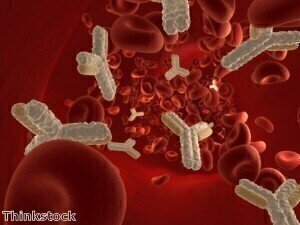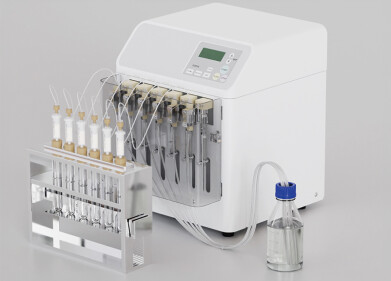Solid phase extraction (SPE)
Team of antibodies fight HIV more effectively, says study
Nov 07 2012
A therapeutic approach gathering proteins from the human immune system can restrain the HIV virus in mice without the necessity for daily doses and could one day be used in humans to treat the disease.
Currently a sufferer of HIV/AIDS has to take a daily dose of many types of drugs to prolong their life. This also means they may have to put up with a myriad of side-effects and the risk of resistance building up.
A new study released by scientists from The Rockefeller University has found that a combination of five potent types of antibodies may suppress the virus for a 60 day period in mice with HIV.
This is a lot longer than current antiretroviral drugs which need daily application.
The antibodies target HIV-1's surface protein gp160, which is infamous for escaping the immune system's attacks by continually mutating.
Effectively suppressing HIV-1 replication, the group of antibodies were only recently discovered by Florian Klein and colleagues in Michel Nussenzweig’s Laboratory of Molecular Immunology at the university.
This particularly potent group was identified and cloned from HIV-infected patients whose immune systems displayed an abnormally high ability to neutralise HIV. They are named broadly-neutralising antibodies.
Recently, these antibodies were discovered to prevent HIV from infecting non-human primates, displaying the potential for a vaccine in humans. They were thought to have minimal or no effect on established infections however.
Before these potent antibodies came along, antibodies generally had been dismissed as a treatment for HIV/AIDS as prior studies demonstrated only a partial result when trying to control the virus. Now the whole notion will be re-looked at with this new discovery in mind, explained Mr Klein.
The key to the discovery is in the combination of antibodies.
One antibody was not able to suppress the virus, neither was a mix of three, however five antibodies in unison proved too complicated for the surface protein, gp160, to mutate its way out of.
"If this could be used as a treatment one day, it is conceivable that patients would only need to take traditional drugs until the virus is controlled, and then receive antibodies every two to three months to maintain that control. We're eager to explore if a benefit in HIV-1-treatment can be achieved in humans," said the researchers.
Posted by Neil Clark
Events
Jan 20 2025 Amsterdam, Netherlands
Feb 03 2025 Dubai, UAE
Feb 05 2025 Guangzhou, China
Mar 01 2025 Boston, MA, USA
Mar 04 2025 Berlin, Germany













